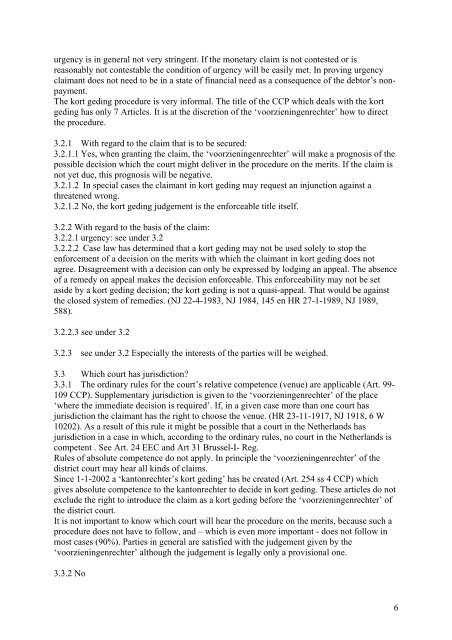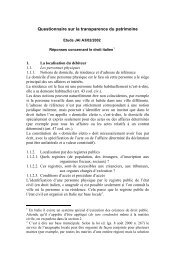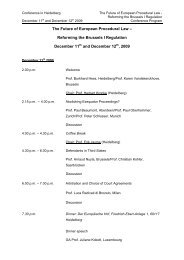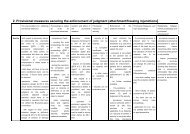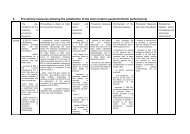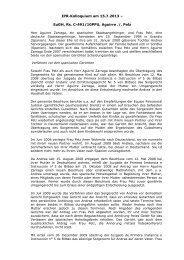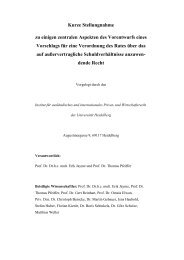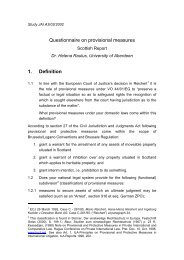1 Study JAI A3/02/2002 The Netherlands: Dr. Mirjam Freudenthal ...
1 Study JAI A3/02/2002 The Netherlands: Dr. Mirjam Freudenthal ...
1 Study JAI A3/02/2002 The Netherlands: Dr. Mirjam Freudenthal ...
Create successful ePaper yourself
Turn your PDF publications into a flip-book with our unique Google optimized e-Paper software.
urgency is in general not very stringent. If the monetary claim is not contested or is<br />
reasonably not contestable the condition of urgency will be easily met. In proving urgency<br />
claimant does not need to be in a state of financial need as a consequence of the debtor’s nonpayment.<br />
<strong>The</strong> kort geding procedure is very informal. <strong>The</strong> title of the CCP which deals with the kort<br />
geding has only 7 Articles. It is at the discretion of the ‘voorzieningenrechter’ how to direct<br />
the procedure.<br />
3.2.1 With regard to the claim that is to be secured:<br />
3.2.1.1 Yes, when granting the claim, the ‘voorzieningenrechter’ will make a prognosis of the<br />
possible decision which the court might deliver in the procedure on the merits. If the claim is<br />
not yet due, this prognosis will be negative.<br />
3.2.1.2 In special cases the claimant in kort geding may request an injunction against a<br />
threatened wrong.<br />
3.2.1.2 No, the kort geding judgement is the enforceable title itself.<br />
3.2.2 With regard to the basis of the claim:<br />
3.2.2.1 urgency: see under 3.2<br />
3.2.2.2 Case law has determined that a kort geding may not be used solely to stop the<br />
enforcement of a decision on the merits with which the claimant in kort geding does not<br />
agree. Disagreement with a decision can only be expressed by lodging an appeal. <strong>The</strong> absence<br />
of a remedy on appeal makes the decision enforceable. This enforceability may not be set<br />
aside by a kort geding decision; the kort geding is not a quasi-appeal. That would be against<br />
the closed system of remedies. (NJ 22-4-1983, NJ 1984, 145 en HR 27-1-1989, NJ 1989,<br />
588).<br />
3.2.2.3 see under 3.2<br />
3.2.3 see under 3.2 Especially the interests of the parties will be weighed.<br />
3.3 Which court has jurisdiction?<br />
3.3.1 <strong>The</strong> ordinary rules for the court’s relative competence (venue) are applicable (Art. 99-<br />
109 CCP). Supplementary jurisdiction is given to the ‘voorzieningenrechter’ of the place<br />
‘where the immediate decision is required’. If, in a given case more than one court has<br />
jurisdiction the claimant has the right to choose the venue. (HR 23-11-1917, NJ 1918, 6 W<br />
1<strong>02</strong><strong>02</strong>). As a result of this rule it might be possible that a court in the <strong>Netherlands</strong> has<br />
jurisdiction in a case in which, according to the ordinary rules, no court in the <strong>Netherlands</strong> is<br />
competent . See Art. 24 EEC and Art 31 Brussel-I- Reg.<br />
Rules of absolute competence do not apply. In principle the ‘voorzieningenrechter’ of the<br />
district court may hear all kinds of claims.<br />
Since 1-1-20<strong>02</strong> a ‘kantonrechter’s kort geding’ has be created (Art. 254 ss 4 CCP) which<br />
gives absolute competence to the kantonrechter to decide in kort geding. <strong>The</strong>se articles do not<br />
exclude the right to introduce the claim as a kort geding before the ‘voorzieningenrechter’ of<br />
the district court.<br />
It is not important to know which court will hear the procedure on the merits, because such a<br />
procedure does not have to follow, and – which is even more important - does not follow in<br />
most cases (90%). Parties in general are satisfied with the judgement given by the<br />
‘voorzieningenrechter’ although the judgement is legally only a provisional one.<br />
3.3.2 No<br />
6


